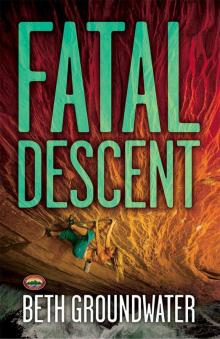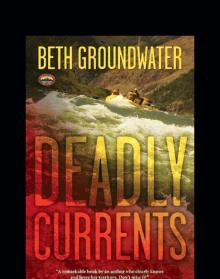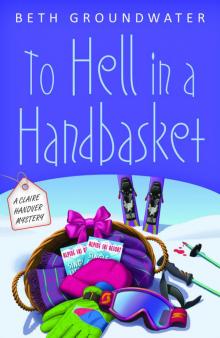- Home
- Beth Groundwater
Deadly Currents
Deadly Currents Read online
Deadly Currents: A RM Outdoor Adventures Mystery © 2011 by Beth Groundwater.
All rights reserved. No part of this book may be used or reproduced in any matter whatsoever, including Internet usage, without written permission from Midnight Ink, except in the form of brief quotations embodied in critical articles and reviews.
As the purchaser of this ebook, you are granted the non-exclusive, non-transferable right to access and read the text of this ebook on screen. The text may not be otherwise reproduced, transmitted, downloaded, or recorded on any other storage device in any form or by any means.
Any unauthorized usage of the text without express written permission of the publisher is a violation of the author’s copyright and is illegal and punishable by law.
This is a work of fiction. Names, characters, places, and incidents are either the product of the author’s imagination or are used fictitiously, and any resemblance to actual persons, living or dead, business establishments, events, or locales is entirely coincidental.
First e-book edition © 2011
E-book ISBN: 9780738729299
Book design by Donna Burch
Cover design by Lisa Novak
Cover image © Ann Manner/Photodisc/PunchStock
Midnight Ink is an imprint of Llewellyn Worldwide Ltd.
Midnight Ink does not participate in, endorse, or have any authority or responsibility concerning private business arrangements between our authors and the public.
Any Internet references contained in this work are current at publication time, but the publisher cannot guarantee that a specific reference will continue or be maintained. Please refer to the publisher’s website for links to current author websites.
Midnight Ink
Llewellyn Worldwide Ltd.
2143 Wooddale Drive
Woodbury, MN 55125
www.midnightink.com
Manufactured in the United States of America
Dedication
To my parents, David and Barbara Howell, whose firm love and fine example instilled in me the belief that I could be and do whatever I set my mind to.
Acknowledgments
First I must thank my literary agent, Sandra Bond, who worked like a bull dog to find a publisher for this new series in a down economy when many other mystery series were being terminated. Also, thanks to Terri Bischoff, acquisition editor at Midnight Ink, for believing that an action-oriented whitewater series would appeal to mystery readers. Thanks to all the staff at Midnight Ink who contributed to this book, especially Connie Hill, senior editor. And thanks to my critique group, Maria Faulconer, Bill Mason, Barb Nickless, MB Partlow, and Bob Spiller, for pointing out where I had more work to do. Thanks to my family for believing in me.
I owe profuse thanks to many experts who gave of their time and advice to make this story as authentic as possible. My friend, Cynthia Hunt, shared stories from her years of river guiding. Darren Olson, owner of Whitewater Encounters, let me tour his business, answered questions, and gave me information on regulations, licensing, and river equipment vendors. Sean Shepard, River Section Supervisor of the Arkansas Headwaters Recreation Area (AHRA), and Stew Pappenfort, Senior Park Ranger of the AHRA, educated me about the career field of river rangering and explained rescue and tree-clearing techniques. Stew graciously allowed me to observe a day of his river ranger training course and to chat with the trainees. Keith Pinkston, Lead Investigator of the Chaffee County Sheriff’s Department, educated me on how their procedures differ from those I learned in the El Paso County Sheriff’s Citizen’s Academy and explained how they work with river rangers in investigating deaths in the river. Texas pharmacist Luci Zahray contributed vital information from her area of expertise. Any errors in fact or procedure are due to my exaggeration or misunderstanding of these experts’ patient instruction.
The upper Arkansas River in Colorado is the most commercially rafted river in the United States, and having taken numerous trips down various sections, I can attest to the excitement and beauty of this unique whitewater wonder. The towns along the river, including Buena Vista and Salida, are chock-full of rafting outfitters and “river rats,” that cowboyish breed of men and women who are addicted to the thrill of riding the bucking bronc called the Arkansas. They work as rafting guides, seasonal river rangers, or whatever jobs they can find—however low-paying—that keep them on the river. I tasted the thrill of running whitewater rivers in open-boat canoes along the foothills of the Appalachian mountains in the 1980s. Communing again with lovers of the sport was a true pleasure. Though the equipment has changed, the attitudes have not. I hope to continue researching and writing about river rat culture—and getting splashed by pure, free-running whitewater.
If a man is destined to drown,
he will drown even in a spoonful of water.
—Yiddish Proverb
“Gonzo’s not going to make it.” Steve Hadley peered upriver, squinting as whitewater spray sparkled in the brilliant June sunlight. His voice held a sharp edge of concern.
“What?” Mandy Tanner dropped her half-eaten PBJ sandwich into the waterproof ammo box on a large boulder beside her. She leapt to her feet. “He never blows Number Four, even with a boatload of clueless tourists.”
Gonzo Gordon was one of the best whitewater rafting guides on the Upper Arkansas River in central Colorado. He was manning the lead boat in this three-raft pod making its way downriver. He knew the Numbers section like an old milk cow knows the path to the barn. But now his raft teetered almost sideways to the rushing current at the top of the class V rapid’s last big drop. Mandy’s fingers clenched as if she was the one straining with all her might on a paddle to fight the current—but in reality, nothing she could do would stop the impending disaster.
The forward side of the raft dove down the precipice, under the boiling foam. Passengers spilled out, legs and paddles flying. Even Gonzo pitched into the water.
Mandy craned her neck for a better view from her vantage point on the river bank, searching for heads as they popped, gasping, out of the waves. Holy cow!
The now lightweight raft, amazingly still upright, launched itself out of the tumbling waves. One wide-eyed woman remained inside, hugging the thwart on which she had been sitting, shoulders hunched in quiet desperation.
Steve sprinted toward a large rock that poked out from the shore into the surging river. “I’ll jump in the raft and pull in bodies,” he yelled over his shoulder. “Launch your cat and pick up anyone who washes downstream.”
The roar of the churning water rang in Mandy’s ears. While running to her cataraft tied up in an eddy nearby, she clipped shut the buckles of her personal floatation device and slapped the right front panel. Yep, her safety knife for cutting entangling ropes was still Velcro-ed to the PFD, and yep, her fanny pack with emergency medical supplies bounced on her rear.
My equipment is ready, but am I?
She unloosed the cataraft’s bowline, which was tethered to a tree, and jumped into the oaring seat clamped onto a metal frame suspended between the two bright blue inflatable pontoons. With a strong pull on the oars, she spun out of the quietly circulating eddy current into the main current in time to see Steve take a flying leap off the rock.
He landed in the middle of Gonzo’s raft, rocking the startled passenger, who stared at him in awestruck hero worship. Steve hopped to the other side of the raft, where a swimmer had managed to grab hold. With one giant heave, Steve gripped the shoulders of the man’s PFD and hauled him in.
Mandy shoved forward on her oars. The current gripped the cataraft and propelled it downstream. She made a corre
ction to avoid a pillow rock on the right, then dug deep with the oars to pull past Gonzo’s raft.
Steve back paddled, trying to slow the raft, to give Gonzo a chance to catch up. Knowing Steve would soon have Gonzo’s raft under control, Mandy focused her gaze downstream. Two heads bobbed in the water as the river swept them along a wide, left curve and out of sight.
Mandy knew she would need a full head of steam to catch up to those two swimmers. And they were in for a rough ride. The river section before Number Five was a rock garden full of unnamed class III and IV waves and holes that pinballed swimmers from one lethal rock to the next.
She recognized the surge of adrenaline she always felt—and relished—when she entered whitewater, and she was excited to finally put her training to the test. Still, she prayed as her cat bounced through the waves. Please don’t let me screw up. Please don’t let me screw up.
This was her second week on patrol as a brand-new seasonal river ranger, still under the supervision of Steve, the head river ranger. Sure, she had run all the whitewater sections of the Upper Arkansas for years as a rafting guide—Pine Creek, the Numbers, Wildhorse Canyon, Brown’s Canyon, Bighorn Sheep Canyon, and Royal Gorge. And she’d pulled lots of swimmers out of the water as a guide. But now guides like Gonzo relied on her to rescue their customers who’d been snatched out of their grasp by the river.
Slowly, Mandy gained on the second swimmer, a young woman. The man in front of her must have fallen out of the raft first or been swept up by the main current sooner. Though Mandy couldn’t see his face, the man seemed strangely calm, unmoving. In contrast, the woman’s arms and legs flailed in the seething whitewater. She bounced off a rock and got smacked in the face with backwash from a hole.
Mandy blew her whistle to catch the woman’s attention then pulled the cat up alongside her. “Grab on!”
Sputtering, the woman slung an arm over the nearest pontoon. A lank strand of wet hair stuck to one cheek and an angry scrape oozed blood on the other.
Mandy leaned forward to grab the back of the woman’s PFD. She tugged the woman up onto the pontoon, so she lay straddled across it, face toward Mandy and backside pointing downstream.
“Hold on to the frame!” Giving herself a mental congratulatory high-five, Mandy picked up her oars again.
According to her training, she should now ferry the woman to shore. But there wasn’t time if Mandy was going to pick up the man before he entered the Number Five rapid, a class V monster, a killer. She just couldn’t leave him to fend for himself.
Heart thudding, Mandy made two strong strokes on the oars and threw in an extra stroke on one side to compensate for her passenger’s weight. She took her gaze off the male swimmer to make a quick check of the woman who lay panting on the pontoon.
“You okay?” Mandy yelled.
The woman nodded, too out-of-breath to respond verbally. Despite her shivering, her white-knuckled grip on the cat’s frame seemed secure, and she had managed to wrap her legs around the pontoon.
Nearing the man, Mandy blew on her whistle, but he didn’t respond. She blew again. Still no response. His head seemed to bob more than the force of the current would create. His limbs hung listlessly in the water. In that unconscious state, he wouldn’t be able to grab onto the boat, and bumping him into an eddy in the fast-moving water was impossible.
“Looks like he’s unconscious,” Mandy shouted to the woman. “I’m going to need your help pulling him in.”
The woman shot her a wild-eyed “What, are you kidding?” look, but Mandy chose to ignore it. The ominous roar of Number Five downstream was way more important.
Powering her oar strokes with her back, Mandy yelled out explanations. “I’ll come up alongside him then pull him onto the other pontoon. I need you to grab whatever you can on him and help pull him up.”
They bounced through a narrow chute between two huge rocks, then hit a relatively unobstructed section of river. It was now or never.
Mandy nudged her unoccupied pontoon next to the man. “Now!”
She reached down to grab him, but the swirling current spun the cat sideways. The pontoon hit the man, whacking his shoulder into a half-submerged boulder.
That’s gotta hurt. Mandy spun the oars in opposite directions to orient the cat and reapproached him. “Okay, again!”
She grabbed the shoulder straps of his PFD and hauled back, bracing a knee against the inside of the pontoon. His chest hit the pontoon, then he started slipping. No, no, no. Can’t lose him.
Just when Mandy thought her back would break, the young woman reached across the gap between the two pontoons. She grabbed one of the man’s arms and pulled. That added enough extra force to get his body up and draped over the pontoon.
“Hold on to him!” Mandy shouted.
She plopped back into the oaring seat and yanked on one oar to counteract another spin the current had put on the cat. Her stroke pointed the front of the cat, weighted down with her two passengers, downstream. Keeping that orientation, with the man’s legs acting as an anchor on one side, would take constant corrections with the oars. But Mandy was determined to get both of these folks safely to shore.
“Hang on to the raft!” she yelled at the woman. “Even if you have to let go of him.”
The young woman gritted her teeth and nodded. Hugging one pontoon with her legs, she hung precariously between the two pontoons. One hand gripped the frame and the other still held the man’s arm.
The deadly current tugged at the sluggish, off-balanced cataraft, pulling it toward the roiling waters of Number Five, an angry maw with sharp, rocky teeth that ate boats and swimmers alive. Mandy strained against the oars, battling the river for control.
What the hell do I do now?
The Chaffee County Road 371 bridge that signaled the start of the rapid loomed a few yards downstream. And there were no eddies large enough to hold the cat before the bridge.
Mandy’s mind searched for an out. Just past the bridge, the river swung right. That, combined with a few large rocks on the left side, had created a small gravel beach on the shore. Next to the beach was an eddy large enough to hold the cat. But if she missed that eddy, the cat would be in the exact wrong position to run Number Five. The boat would flip. She’d risk three lives.
But there was no other option.
She braced her feet against the frame and pulled on the oars, again and again, trying to slow the cat’s speed and set up a cross-stream ferry. The steep, rocky river banks slipped past as the cat moved relentlessly downstream.
More adrenalin surged through Mandy, fueling her strokes. She refused to let the river get the best of her. Ignoring the burning pains in her arms, she focused on keeping the cat at the proper angle.
Finally the force of the rushing water started pushing the cat toward shore. She pulled on the oars one, two, three more times. Still not there.
Number Five’s horizon line loomed just yards away. A huge tongue of water plunged hungrily over the edge.
The young woman stared at the precipice then at Mandy, her eyes wide saucers of fear and doubt.
Unable to speak, Mandy grunted in sympathy at her and pulled again and again, aiming for the eddy line. If she could get the pontoon holding the man’s body past the line, his legs in the upstream current of the eddy would help swing the cat around. She let out a groan on one more stroke, knowing this was her last.
Finally, the cat slipped across the eddy line into the quiet water behind the rocks. Mandy gave another feeble stroke, but it was enough. With the man acting as a makeshift anchor, the other pontoon slid out of the treacherous current.
She caught her breath, then yelled at the woman. “Stay there until I pull the raft onto the beach.” If the woman put a leg out into the main current, she would be a goner.
Mandy slid into the thigh-deep water next to t
he cat. She gasped as the ice-cold water seeped into her wetsuit. Scrabbling up the gravel bank, she tugged the pontoon on which the man lay out of the water.
“Okay,” she said to the woman. “Slide off this side of your pontoon and hold on to the other one until you’re on the beach.”
The young woman eased off her pontoon and stumbled onto the beach. Once there, she pulled on the cataraft also.
“Thanks,” Mandy said, grateful both that the woman had the energy to help and was okay—unlike her other rescuee.
After they had beached the cat, Mandy tied the bowline to a tree. Then she checked on the man. He lay across the pontoon, unmoving, his face gray.
Not good. Definitely not good.
Wanting nothing more than to collapse on the gravel, Mandy knew she couldn’t. She slipped her hands under the man’s armpits and dragged him on his back onto the beach. He was tall, middle-aged, and had a fair-sized beer gut on him. He must have weighed well over two hundred pounds, which didn’t compare well to Mandy’s one-twenty-five. Her arm and leg muscles quivered with exhaustion.
Once on the beach, she fell to her knees beside him. She put her ear to his mouth and nose and watched his chest. A faint wisp of air tickled her ear, then another, as his chest rose and fell shallowly. Thanking God, she felt for a pulse. It was weak, fluttery.
Mandy pulled out her radio. She looked at the woman who knelt nearby, hands on her knees, catching her breath. “Will you watch him, let me know if he gets worse in any way, while I call for an ambulance?”
She nodded and scooted next to the man.
“Thanks again.” Mandy keyed the mike. Between labored gasps, she relayed her location to the dispatcher.
“Hey.” The young woman tugged on Mandy’s arm. “I think he’s stopped breathing.”
Mandy shoved the radio at the woman. “Tell the dispatcher.”
She put her fingers against the man’s neck. No pulse. She listened for breathing. None. She gave him two full breaths mouth-to-mouth then rechecked. Still nothing. She unzipped his PFD and ripped it open. Counted to thirty as she did chest compressions.

 Fatal Descent
Fatal Descent Deadly Currents
Deadly Currents A Real Basket Case
A Real Basket Case To Hell in a Handbasket
To Hell in a Handbasket 3 A Basket of Trouble
3 A Basket of Trouble